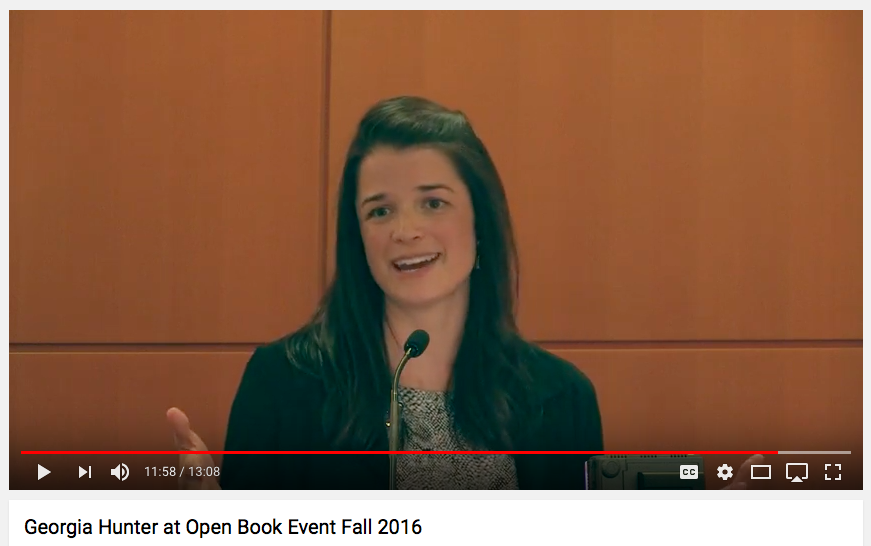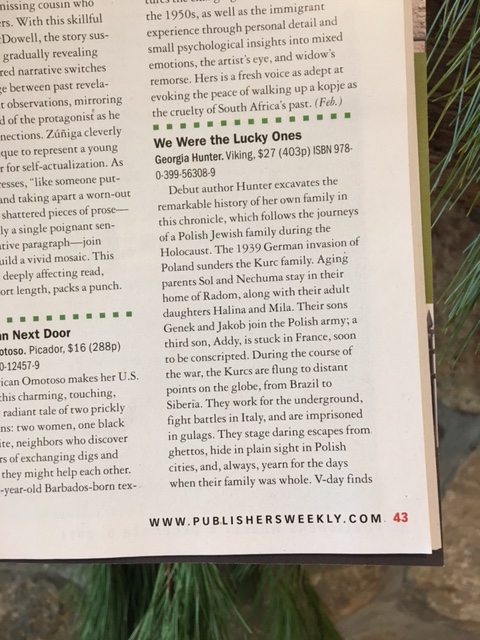Two weeks ago, I had the honor of being invited by Penguin Random House (PRH) to join a panel of six authors with forthcoming titles at an Open Book event in New York. Our assignment, we were told prior to the event, was to speak for ten minutes each about our books to a group of 100 librarians from the Tri-State area. Despite the fact that a podium + an audience made my heart palpitate, I jumped at the offer, grateful for the chance to share the story behind We Were the Lucky Ones with an auditorium full of book lovers, and also for the chance to give thanks to the librarians around the world I’d relied upon in my research.
When I arrived at PRH’s Manhattan headquarters, I was whisked upstairs to a green room, where my nerves were quelled when panel member (and highly seasoned speaker/author) Jennifer Boylan introduced herself and laughed about how ironic it was that our publishers had asked us to speak–“Don’t they know if we wanted to speak in public,” she quipped, “we’d have been actors, not writers!”
The five other author talks were incredibly captivating, and it was a privilege to meet these writers and to learn first-hand about the storylines and thought processes that went into their novels. I’ve included links to my fellow presenters’ websites at the end of this post, and if you’d like to check out my talk on YouTube, you can do so here.

Soon after the Open Book event, I was thrilled to learn that We Were the Lucky Ones had been reviewed by the trade news magazine Publishers Weekly.
“…Hunter side-steps hollow sentimentality and nihilism,” Publishers Weekly writes, “revealing instead the beautiful complexity and ambiguity of life in this extraordinarily moving novel.” (complete excerpt below)

We Were the Lucky Ones written up in Publishers Weekly
A few days later, I received another review of sorts, this time from a cousin in Israel…and while I’m thankful beyond belief for my first glowing industry review, reading Alain’s feedback felt even more meaningful.
Weeks before, I’d sent galleys to a few of the Kurc relatives I’d visited and interviewed in my research, without whom my book could never have been written. One of those relatives was Anna, daughter of my grandfather’s sister Halina. Anna read the book in two days and told me over Skype how moved she was by it, and that she’d passed the galley on to her oldest son, Alain. A few days later, an email arrived that made my heart swell.
“Thank you for bringing to life our family, for answering so many questions I never dared to ask,” Alain began. “Your rendering of the [Kurcs’] daily struggle for life brought tears to my eyes. I thank you for those tears, as they also made it obvious to my children that I was not ‘just reading another book,’ that the story I was reading was so very special because it was also my story, also their story. Thanks to you, I’ve learned so much about where I come from…I feel stronger. Thank you for this incredible gift.”
Thank you, Alain, for these words. I can’t describe the emotion–the relief and the pride and the overwhelming gratitude–that courses through me every time a relative tells me what the book has meant to her or him. It was for the family, after all, and for the generations to come, that I wrote the book in the first place.
With Alain’s sentiments warming me to the core, I wish you all a holiday full of laughter and love and most of all, the gift of family.
~Georgia
PRH’s Open Book Event Panel Members:
J. Courtney Sullivan
Will Schwalbe
Hannah Tinti
Jennifer Finney Boylan
Holly Black
Publishers Weekly’s Complete Review:
“Debut author Hunter excavates the remarkable history of her own family in this chronicle, which follows the journeys of a Polish Jewish family during the Holocaust. The 1939 German invasion of Poland sunders the Kurc family.
Aging parents Sol and Nechuma stay in their home of Radom, along with their adult daughters Halina and Mila. Their sons Genek and Jakob join the Polish army; a third son, Addy, is stuck in France, soon to be conscripted. During the course of the war, the Kurcs are flung to distant points of the globe, from Brazil to Siberia. They work for the Underground, fight battles in Italy, and are imprisoned in gulags. They stage daring escapes from ghettos, hide in plain sight in Polish cities, and, always, yearn for the days when their family was whole.
V-day finds some of the Kurcs together, but the celebration is empty; they are still sundered, mourning, and directionless. The Kurc family’s final triumph is not tied to the defeat of the Nazis, but to the family’s survival and reunion against impossible odds. However, this is not a saga with a jubilant Hollywood ending, The Kurc family’s survival is often due to nothing more than desperate luck. Hunter sidesteps hollow sentimentality and nihilism, revealing instead the beautiful complexity and ambiguity of life in this extraordinarily moving tale.”